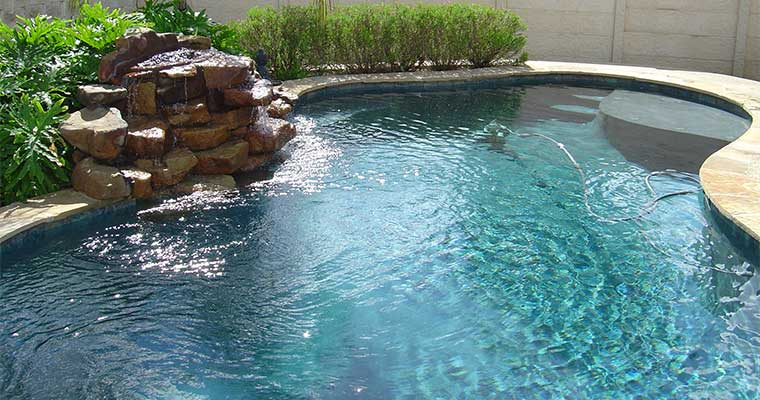Salt Water Pools and Saltwater Pool Systems Are Gaining Popularity!
Chlorine Stinks! That’s what some homeowners are saying. They’re fed up with the smell, the chemicals, the maintenance, and the reddening, eye-stinging chlorine in their pools.
It’s the feel, mostly. Once upon a time, you could only find salt water pools in spas and exclusive resorts. We’ll bet you remember the first time you slipped into one. It was so soft, so pleasant, so warm, and it actually made you more buoyant in the water. It’s so much easier to swim in salt water! Your eyes didn’t sting, and even if you did get a little water up your nose, or accidentally swallowed it, it didn’t burn you like chlorine would. You felt at home.
Let’s look at the story behind salt water pools, how to take care of them, and how to enjoy them!
More and more, pool owners are transitioning over to salt water. Why?
Salt Water Pool Facts:
- Salt water pools don’t make “Chloramines”. That’s the stuff that smells so bad, and makes your eyes all puffy and red. Instead, the salt is separated into a little chlorine, and the rest is water with a few harmless minerals in it. You’ll notice that the pool is not as salty as the ocean, but actually contains about as much salt as in human tears. That makes it really, really comfortable.
pentair-salt-systemgoldline - Salt Water is very easy to maintain! Just add salt at the beginning of the season, and mid-season, add a little more! Your pump sometimes called and “ECG”, may need some adjustments if you see cloudy water. This is easily done by your pool professional.
- Salt water pools do not affect color treated hair! Have you ever had guests over who couldn’t get in the pool because they’d recently colored their hair? You’ll never have that problem again, and your guests can feel totally at ease, knowing their hair will be fine!
- No more daily testing! Imagine, just walking to your pool and getting in. Remember testing every day, worrying about chlorine levels, wondering if you have to add anything, and possibly wait hours before you ventured into your pool? That’s over with. With salt water pools, you can dive right in. No constant adding of chemicals! No test kits needed! Your pool professional technician will test occasionally to make sure that pH levels are good, and a tiny bit of muriatic acid can usually fix the little variances. Chlorine levels will remain nice and stable. One thing you’ll notice – a lot less hassle!
Converting To Salt Water Is Easy.
Corts Pools will quote you for your conversion and do all the work for you. They’ll make sure that your pool is properly prepared, including treating any metals in your pool against salt corrosion, and cleaning your pool prior to your new salt being added! You get to sit back, and watch. What could be easier?
Are you interested in finding out how much you can save by converting to salt water? Call Corts Pools Today and get A Free Estimate! 951-775-2678
Remember: Corts Pools is trained and certified by the National Swimming Pool Foundation and the Independent Pool and Spa Association!
Save Money with Salt Water Pools!
You’ll find that you will spend a fraction of what your would normally pay for a chlorine system. On average, salt water pool owners spend 20% of the cost of a chlorinated pool. That’s a lot of savings! Salt equals lower annual costs since a salt chlorination generator makes chlorine at about $1 per pound, while off-the-shelf pool chlorine sells for $2 to $4 per pound. One of our customers says she used to spend about $800 per year to chlorinate her freshwater pool, but only $150 per year to chlorinate her saltwater pool.
Saltwater Pool Drawbacks
- Saltwater pools aren’t perfect, or perfect for every pool owner.
- High startup costs: The top expense is the ECG, which ranges from $600 to $1,200, plus another $150 for installation.
- Cell replacement costs: Salt cells inside the ECG should be replaced periodically: sooner (4 to 5 years) if you use your pool year-round; later (maybe 10 years) if your pool season is only a few months a year. A cell costs $200 to $600.
- Salt corrodes: Saltwater can corrode anything in or around your pool that contains metal, like lights, heaters, screws, diving board attachments, and patio furniture.
- Salt stains: Saltwater splashing on soft stone on pool coping and decks can leave stains and pockmarks. Apply a sealant to solve this problem.
Conclusion
If you are debating the reasons to switch to salt in your swimming pool, I would give us a call to discuss further. We’ve had many pool owners that have used regular chlorine for years make the switch to salt and absolutely love its benefits and ease of use. At the end of the day, the reason you own a pool is to relax and enjoy it. We can help by using a salt chlorine generators.

